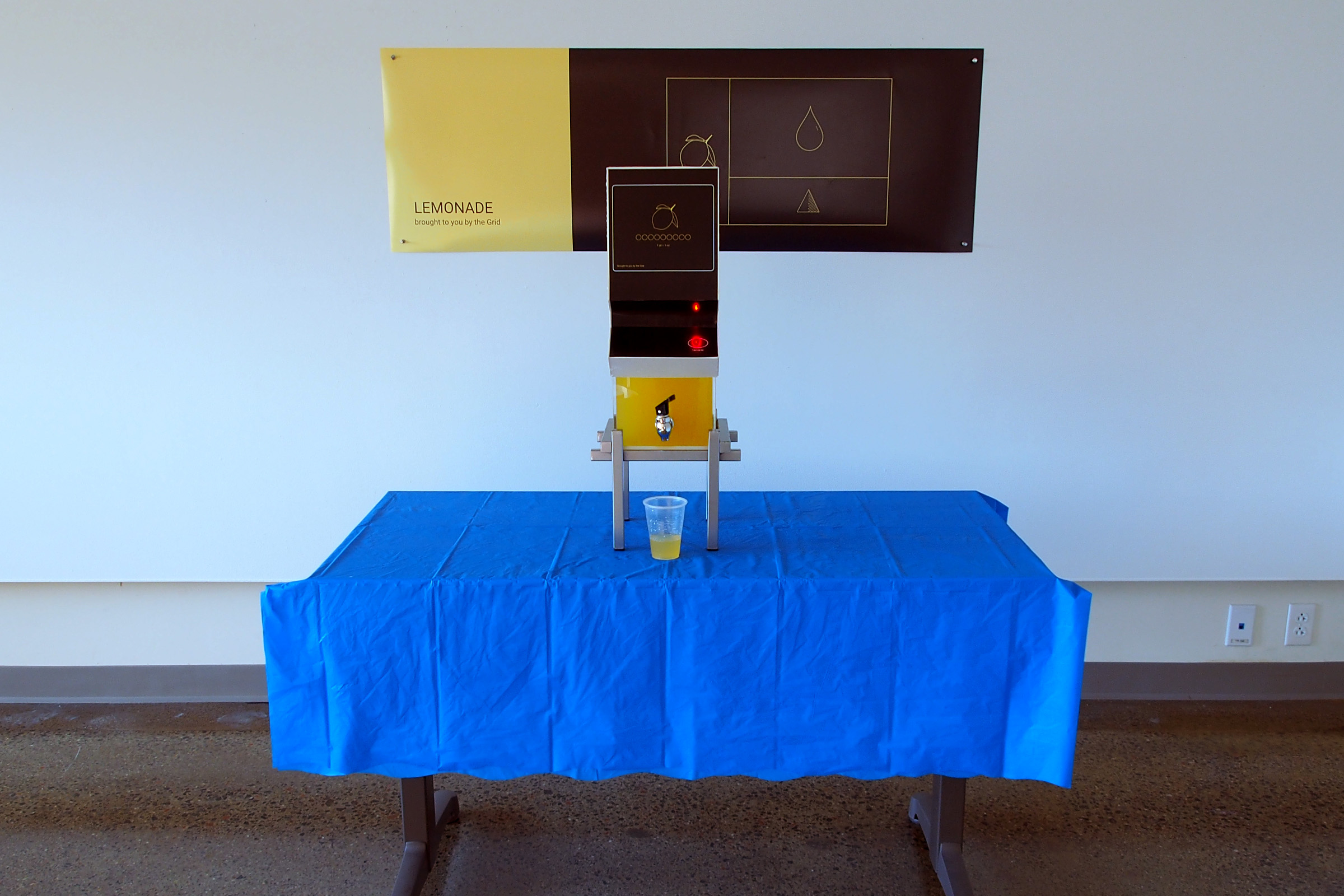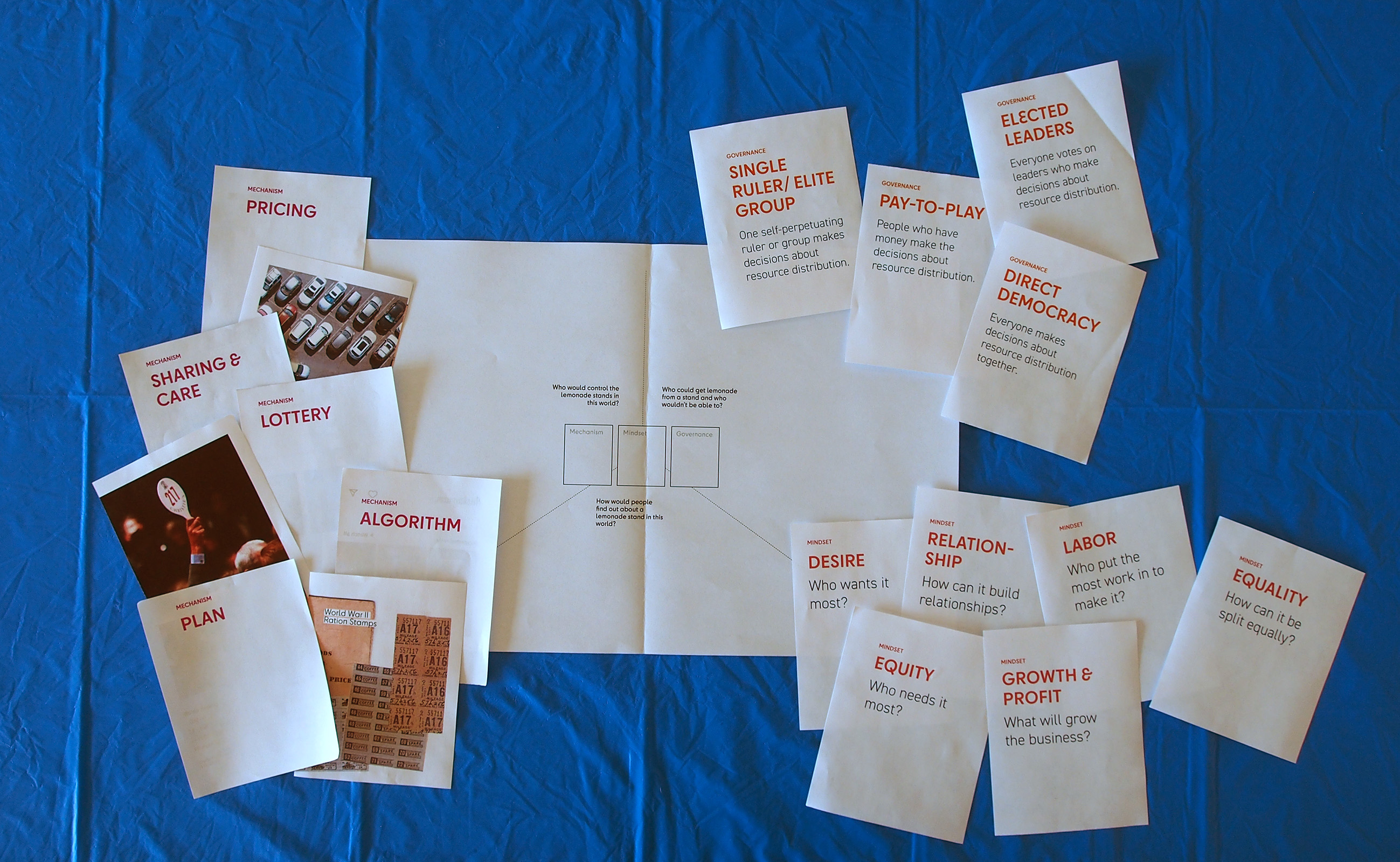January 2022 - March 2023
Text by Alix Gerber & Eleni Andris
Lemonade 50¢
Imagining economies without markets through speculative lemonade stands







On the weekend of March 25, University of Massachusetts Amherst hosted a conference called “Building Worker Power through Solidarity, Cooperation & Care”. The conference brought together worker co-operatives and union organizers to discuss shared histories and future visions. Alix and Eleni hosted a workshop called ‘Lemonade 50¢: Imagining economies without markets’:
As workers take control of their own labor and resources, we have an opportunity to imagine the kinds of economies we want to build together. In the United States, lemonade stands are a symbol of a child’s first foray into capitalist markets– a way to teach pricing, profits and entrepreneurship. Building on this symbolism, the workshop used the lemonade stand as a setting for participants to dream freely about future economies without markets. First, participants experienced three interactive exhibits that distribute lemonade via capitalist markets, democratic planning, and algorithmic budgeting. After a discussion about this experience, participants worked in groups to create their own lemonade stands exploring different ways of distributing resources. Participants used mindmapping and drawing to envision and share the economic alternatives they dream of.
The Lemonade 50¢ workshop asked participants to imagine a new economy by drawing a lemonade stand that would exist within it.
As workers take control of their own labor and resources, we have an opportunity to imagine the kinds of economies we want to build together. In the United States, lemonade stands are a symbol of a child’s first foray into capitalist markets– a way to teach pricing, profits and entrepreneurship. Building on this symbolism, the workshop used the lemonade stand as a setting for participants to dream freely about future economies without markets. First, participants experienced three interactive exhibits that distribute lemonade via capitalist markets, democratic planning, and algorithmic budgeting. After a discussion about this experience, participants worked in groups to create their own lemonade stands exploring different ways of distributing resources. Participants used mindmapping and drawing to envision and share the economic alternatives they dream of.
The Lemonade 50¢ workshop asked participants to imagine a new economy by drawing a lemonade stand that would exist within it.

It started with a card deck with prompts in three categories: governance models (how decisions are made), allocation mechanisms (how lemonade is allocated to certain people), and mindsets (motivating principles behind a certain allocation model). We’re grateful to Aaron Tanaka and Sarah Wang at the Center for Economic Democracy for lending their suggestions and ideas on this. While capitalism involves a variety of factors beyond a market-based allocation mechanism, we focused this workshop specifically on exploring how resources could be allocated beyond markets.
Participants imagined a world that responded to their prompts by collectively answering questions such as: “Who would control the lemonade stand in this world?” ; “Who could get lemonade from a stand and who wouldn’t be able to?” ; “How would people find out about the lemonade stand in this world?”. Then, they drew a lemonade stand that would exist in this landscape.
As groups shared their ideas, we talked about how a speculative exercise like this one could be used by activists, organizers, and working people outside of traditional design/academic spaces to support existing transformational work.
Lemonade stands
Before participants took on the task of creating a lemonade stand for themselves, they explored three stands that we created from economies that allocate lemonade through capitalist markets, democratic planning, and algorithmic budgeting.
Participants imagined a world that responded to their prompts by collectively answering questions such as: “Who would control the lemonade stand in this world?” ; “Who could get lemonade from a stand and who wouldn’t be able to?” ; “How would people find out about the lemonade stand in this world?”. Then, they drew a lemonade stand that would exist in this landscape.
As groups shared their ideas, we talked about how a speculative exercise like this one could be used by activists, organizers, and working people outside of traditional design/academic spaces to support existing transformational work.
Lemonade stands
Before participants took on the task of creating a lemonade stand for themselves, they explored three stands that we created from economies that allocate lemonade through capitalist markets, democratic planning, and algorithmic budgeting.


The capitalist market stand sells cups of lemonade in three ‘flavors’ (Artisanal, Traditional, and 4 Kidz) for 10¢ at the beginning of the sale, but by the end the price has been raised to 50¢.


The democratic planning stand offers cups of lemonade freely to anyone who can make it to their current location. The stand appears to be run by the Connecticut River Valley Recreation Committee, who runs a Lemonade program, hosting stands in different towns each week. Selected towns appear to be those with the lowest water quality in the area. A summons letter shows that residents are randomly selected to serve on this committee to equitably distribute lemonade and other recreational resources.


The algorithmic budgeting stand dispenses lemonade from a kiosk that requires a tap from a phone showing a budget. The budget lists points allocated between categories like air travel, clothing, movie theater, bike shop. What if every person had the same number of points to allocate between categories that were most important to them? What if social media algorithms suggest a point budget that it thinks you might like?